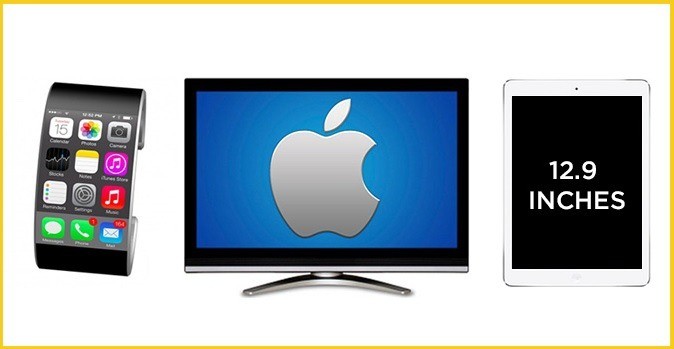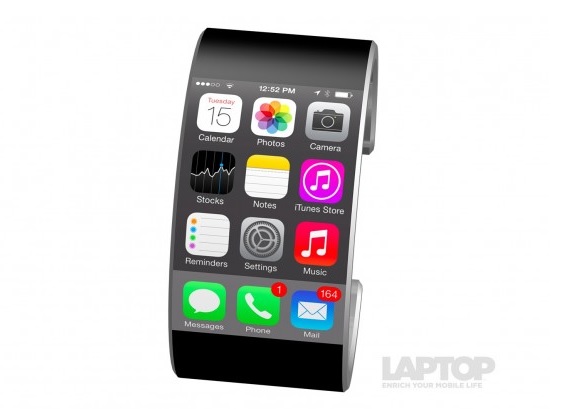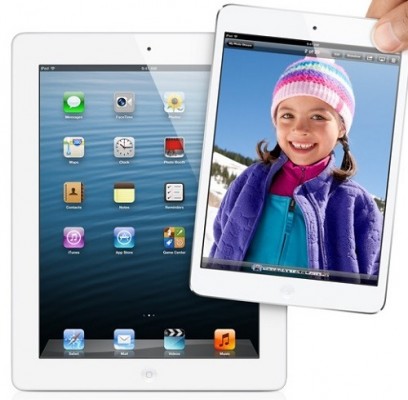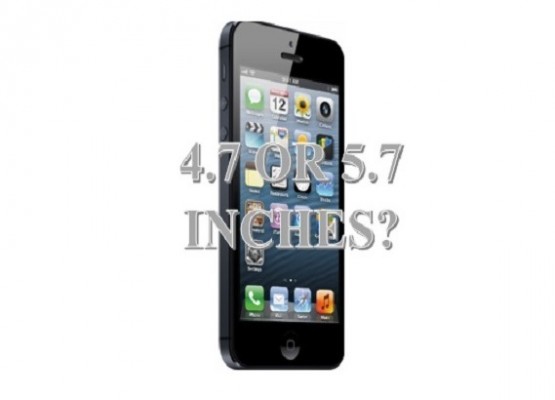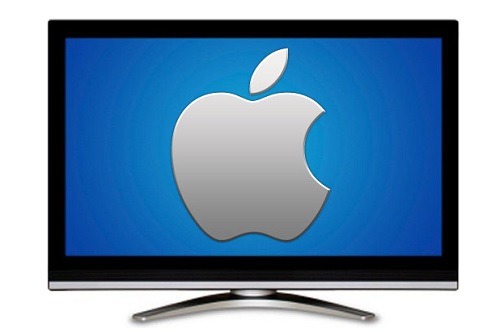New Apple Products: What to Expect in 2014
Sign up to receive The Snapshot, a free special dispatch from Laptop Mag, in your inbox.
You are now subscribed
Your newsletter sign-up was successful
Would you want a watch that runs iOS apps? How about an iPad that's as large as your 13-inch MacBook screen? These are just two of many products Apple may have in its pipeline for 2014. The past two years have heralded new iPhone models, improved iPads and more MacBook options, but 2014 could be the year Apple breaks into entirely new product categories.
Apple is notorious for its secrecy, which makes it all the more intriguing to speculate on what the future might hold. Based on rumors, clues and some analyst insight, here's a look at what we may see from Apple in 2014.
MORE: Top iPhone 5s Accessory Gifts
The iWatch
It's been nearly one year since rumors about Apple’s iWatch have inundated the media. An Apple patent for a "bi-stable spring with flexible display" published last February sparked speculation that an Apple-branded smartwatch is on the way. There have been numerous indicators that Apple could be planning to delve into the smartwatch space. In July, Apple filed a trademark for the term "iWatch" in several countries, including Japan, Mexico and Taiwan. Apple's own Tim Cook has said that wearable technology, specifically products such as the Nike Fuelband, is a ripe area of interest.
But should we expect an iWatch in 2014? According to Avi Greengart of Current Analysis, there's a "high probability" that we’ll see a wearable tech device from Apple next year. When speaking at this year’s D11 conference in May, Cook said that a wearable device would need to convince people that it's "so incredible you want to wear it" in order to be successful. Greengart says an iWatch is likely to do just that.
MORE: 10 Killer Features for Apple’s iWatch
"To transition from the early adopter to mainstream, you need to explain to [consumers] why they need this," Greengart said, adding that selecting specific use cases for a smartwatch rather than loading it with an overwhelming amount of features would be a more successful strategy.
Sign up to receive The Snapshot, a free special dispatch from Laptop Mag, in your inbox.
"That actually is Apple’s specialty," the analyst said. "One of the key reasons industry observers are watching Apple is because they have a history of selecting a minimal feature set and showing consumers why they want it."
It's too soon to predict the type of functionality we’d see from an iWatch, but Greengart says that fitness is "high on the list" of potential features. Cantor Fitzgerald’s Brian White, an analyst who says he has sources in Apple's Asian supply chain, has noted that the iWatch could be used as a wearable home automation device.
Verdict: Likely
The 12.9-inch iPad
In recent weeks, rumors have suggested that Apple is testing 12.9-inch touch-screen display panels for iPads for release in 2014. The reports, which have largely originated from such Asian sources as The Korea Times and PadNews, have said that the company is testing both 2K- and 4K-resolution panels in this size.
While some of these reports claim to have supply chain sources, Greengart finds this to be a less likely option for Apple. The Current Analysis expert says that a bigger iPad is certainly possible, but that it would be difficult to pinpoint specific use cases to pitch to consumers.
"Apple already has something with a permanently attached keyboard that comes in a 13-inch size: the MacBook Air," he said.
There are a fair number of 13-inch Windows 8.1 hybrid devices available already, such as the Toshiba Click and HP Split x2, that come with detachable keyboards. However, going down a similar path for the iPad would appear to contradict Apple's outlook on such devices.
MORE: Top Tablet Gifts
"Apple has been adamant that computers and tablets are different things," Greengart said. Cook made this point extremely clear at an Apple keynote earlier this year, where he took a direct jab at Windows 8.1 laptop-tablet hybrids by calling the market "confused."
If Apple does plan to launch a 13-inch slate, which Greengart says could be called the iPad Pro, the company is likely to market it toward businesses and salespeople who would use the larger display for presentations. Apple could also pitch the consumer angle by encouraging users to purchase an iPad in one of three flavors, depending on specific use cases.
Keeping the iPad extremely light in weight would be a crucial factor, Greengart says. While it's likely that Apple could be developing a 13-inch iPad, Greengart isn't "banking on it."
Verdict: Unlikely
A Larger iPhone 6
If the 4-inch Retina display touchscreen on the iPhone 5s isn’t large enough for you, Apple may have something more your style soon enough. Ever since Reuters reported that Apple is testing 4.7 and 5.7-inch screens for future iPhones, rumors have suggested that a larger iPhone is in Apple’s pipeline. And, according to Greengart, Apple would be wise to do so.
“I do think there will be a larger option,” he said. “It’s one of the key reasons iPhone users leave and go to the competition.”
Should Apple decide to launch a larger iPhone, it would probably do so in conjunction with a standard 4-inch model. Greengart says that Apple is likely to offer a bigger iPhone as an alternative option to the regular size in an effort to appeal to a wider audience.
“Some people love [phablets] because they don’t hold their phones up to their ear often or they use Bluetooth headsets for phone calls,” he said. “Or they so love that larger display for media that they’re willing to forego voice as a comfortable use case. Apple is not offering consumers that choice right now.”
Verdict: Likely
MORE: iPhone 6 Features: What We Want From Apple
Apple TV
While vendors such as Samsung and LG are vying against Apple for dominance in the mobile space, it doesn't look like they'll have to defend their turf in the HDTV territory anytime soon. Despite the flurry of iTV rumors in recent years, 2014 isn’t shaping up to be the year we see Apple's first television set, Greengart says.
"I think we already have an Apple TV-- the Apple TV," he said, referring to Apple's streaming set-top box. "They’re selling a lot of those things."
In addition, releasing a self-branded HDTV wouldn’t align with Apple’s current product cycle. As Greengart acknowledges, laptops, computers, smartphones and tablets all have much shorter life cycles. Consumers are likely to replace their smartphones every 18 months to two years, while computers are typically replaced anywhere between 18 months and 5 years. Televisions can last for 8 to 10 years, the analyst says.
"It's still a different business model than Apple has been in to date," he said.
However, should Apple decide to delve into the TV business, it would be more than equipped to do so in terms of manufacturing resources. The 27-inch 2560 x 1440 display panel you’ll find on the iMac's monitor isn't much different than what Apple could produce for a television set.
"They've certainly invested in display technologies on the manufacturing side," Greengart said. "From a manufacturing perspective, there isn't much preventing Apple from doing this. It's just a different class of product."
Verdict: Unlikely
MORE: Top TV Gifts 2013
Outlook
While Apple’s plans for 2014 are still largely a mystery, it seems likely that the company will favor certain new product categories in an effort to propel growth. It seems likely that Apple will join the likes of Samsung, Nike and Fitbit in launching a wrist-worn tech accessory that syncs with your smartphone, even if it's not a true smartwatch. An iTV seems less much less likely for 2014. And while we could see a big-screen iPad, Apple doesn't seen keen on hybrids.
At the same time, Apple is likely to continue improving on its already lucrative line of devices. “For consumers, there’s nothing wrong with [Apple] iterating on its already successful products,” Greengart said. “It might not be hoverboards or flying cars, but if you’re competing with Apple and trying to sell your tablets or smartphones against its improving tablets and smartphones, you’re going to be in a very difficult position.”

